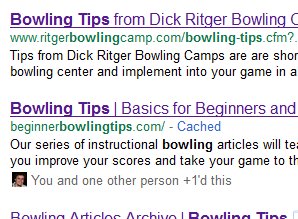Q: How is SEO changing today and will it become more of a social thing as I’ve heard some predict?
Search engine optimization has traditionally had few, if any, social components.
It was a world where mediocre content coupled with masses of backlinks was a surefire path to the top of the search engines. Webmasters who cleverly interlinked their content and made hundreds of directory submissions, forum signatures and reciprocal or three way link exchanges enjoyed floods of traffic.
Many times, these sites didn’t have much to offer other than a few average pages of content and prominent contextual advertisements or affiliate links. Some sites, known as MFA or “Made for Adsense,” purposely had a lack of content on the page so visitors would have little to do but click on an ad.
On these websites, there wasn’t anything that you’d want to tell your friends about. It’s unlikely you would stay on the site for a long time, and once you left, you probably would never return again.
Google hated the fact that these poor quality, untrustworthy sites were dominating their results pages, but with an algorithm based heavily on backlinks and on-page keyword usage, there was little they could do.
Algorithm Changes Force Webmasters to Think About People
All of this changed forever with a couple of major algorithm changes which are now referred to as the Panda Update. The first installment, in February 2011, was designed to penalize sites “which are low-value add for users, copy content from other websites or sites that are just not very useful” and reward those featuring “original content and information such as research, in-depth reports, thoughtful analysis and so on.”
A second update in June continued on the same theme, and a huge group of webmasters who relied on backlinks and content that looked attractive solely to search engine spiders found their whole online businesses in jeopardy.
In order to have success after Panda, webmasters must now get social and consider the needs of their visitors. User experience and site design are becoming increasingly important, and Google is really starting to reward the sites that people genuinely want to share and return to regularly. Is that site attractive and well-laid out, or does it look like it hasn’t changed since the 90s? Are there intrusive ads obscuring the content?
Other social metrics that Google is using include user behavior, including the bounce rate and average number of pages viewed by visitors. When someone lands on your site, do they stick around and read several pages, or do they go right back to the search engine results page to find a better option?
Simply put, the days of designing a site for search engines is dead; you must think about people and strive to give them quality content and a positive browsing experience.
Social Search and Google +1
Social search is an emerging aspect of SEO that factors in recommendations of people in your social circle when presenting search results.
 The Google +1 button, the company’s answer to the Facebook like, is shorthand for “this is pretty cool” or “you should check this out” and they say it is designed to “help friends, contacts, and others on the web find the best stuff when they search.”
The Google +1 button, the company’s answer to the Facebook like, is shorthand for “this is pretty cool” or “you should check this out” and they say it is designed to “help friends, contacts, and others on the web find the best stuff when they search.”
It’s likely you have already noticed +1’s affecting your search results (see above), and it will be interesting to see how Google continues to develop social search.
Since people would often prefer to trust recommendations from real people as opposed to a shadowy algorithm, and some are predicting that social search is poised to do away with traditional SEO entirely. Tom Critchlow of SEOmoz also points out that +1s are much more difficult to fake than traditional backlinks, and unscrupulous webmasters will have much less incentive to try and game social search.
Do you think social search will take over sooner rather than later? Do you think Google is finally winning the war against spam and do you embrace the changes from the Panda update?
Andrew Walsh is the owner and editor of Social Web Q and A. He is a freelance writer, academic librarian and web entrepreneur. Check out his book Savvy for the Social Web.










Hey this was really useful. It gave me a whole new perspective on what’s going on with the web these days. Great site!
Thanks for the compliment! We’re planning to add a lot of cool things to this blog.
And these social search changes are pretty huge: I hope they can lead to a better web for everyone, both webmasters and surfers.